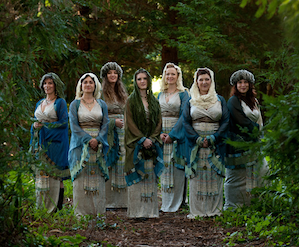
The Kitka Women’s Vocal Ensemble, which specializes in Eastern European song traditions, went on a three-week tour of Serbia and Turkey in late June and early July. The trip was part of an international song-preservation expedition and involved discovering lost folk music; learning unusual vocal techniques; singing in concert halls, cafes, and kitchens; and otherwise reflecting nearly forgotten singing traditions back to local communities.
I spoke to the ensemble’s executive director, Shira Cion, who noted some of the high points of the trip, which began in Serbia. She recounted driving down one of the main thoroughfares in Belgrade, past the ministry of defense, which still lies in ruins following a NATO missile attack in May 1999.
“They haven’t figured out what to do with the building, and it remains a monument to the bombardment. In all my travels I have never seen anything quite like that.
“But when we met with people, although there is always a very strong nationalistic sense, we didn’t get into the details of the [recent] war. We made a conscious choice to avoid that, if only because it brings up so much pain. We kept our focus on finding traditional songs and encouraging people to sing them, and actually many of the songs reminded people of the times before the war — lost times — and in that sense this was a healing effort, a kind of reconciliation with the past.…
“One night we met a former refugee, an ethnic Serb from Croatia — which is an aspect of the war you don’t hear much about. He’d been badly injured while deactivating a mine field, and had lost both legs and his right arm. He was a sculptor and a well-known artist; after the war he retaught himself how to be a painter. One night after one of our concerts he invited us to his atelier and offered several of his paintings. It was appreciation in return for our singing, and what that meant to him. This was very much in the spirit of interactions we had with people.”
Many of the songs reminded people of the times before the war — lost times — and in that sense this was a healing effort.
The ensemble also visited Lazona, Turkey, home to one group of the Laz people, who live around the Black Sea in northeastern Turkey and also in southwestern Georgia. Under Byzantine rule in the 10th and 11th centuries, the Laz were largely Christian. But with the rise of the Ottoman Empire, the Laz in Turkey converted to Islam and became Hanafi Sunnis. The Laz in Georgia remain Eastern Orthodox. The Laz language is not spoken, and folk literature and music have not been systematically recorded. Beyond capturing this folkloric legacy, Cion says that simply being with the Laz people, just hanging out, became perhaps the highpoint of Kitka’s trip. There was one afternoon and evening in a kitchen that she will always remember:
Thanks to this common interest in music, we were able to connect on a very personal level, and so ended up talking about the most intimate things. There was one woman we met who had a special-needs child. Two of Kitka’s members also are mothers to special-needs children. We never would have discovered this profound shared experience had we not been singing together about our dreams for our children.I kept realizing how much singing becomes a way of bridging cultures. It really made us appreciate how important this work really is.
There were also songs related to marriage, both happy and unhappy, which in turn opened up the door to talk about loves and lost loves. It was such a beautiful moment.
As you can imagine, the process of leaving these places was often very difficult. In fact, we were crying our eyes out. It was just so intense. I mean, I know it sounds corny, but I kept realizing how much singing becomes a way of bridging cultures. It really made us appreciate how important this work really is, not least on a personal level — because it’s when you extract yourself from the hustle of daily life, your to-do lists, all your obligations — it’s when you get away from all that and put yourself in an unfamiliar situation, even with people whose language you can’t speak and whose customs are very unfamiliar, when you put yourself in that position of vulnerability and openness, you reach a much deeper kind of contact.
Cion paused and then added, “In all these places we went, there is an incredible tradition of hospitality. We felt so honored, which is perhaps a lesson for Americans — how to treat guests, how to take the time to cultivate curiosity, how to slow down and make room in your life to know someone new. I think that’s what traveling does, and on the wings of song gives us this extra tool — a key to one’s heart — and in that way songs become passports to others’ hearts.”
Kitka’s season begins with an appearance at the International Body Music Festival, on Nov. 5 in Oakland.
